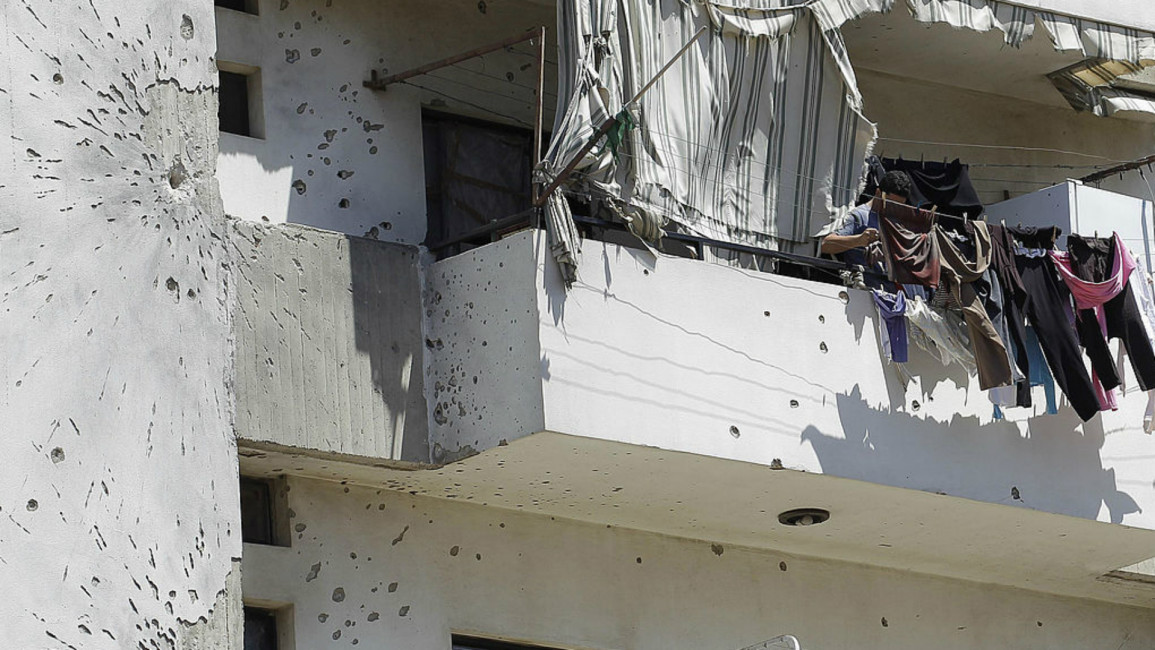
A conflict revisited: From Bab al-Tabbaneh to Aleppo
On December 20, 1986, Khaled Chashir escaped one of the bloodiest massacres of the Lebanese civil war. He remembers seeing the Syrian military enter his neighborhood of Bab al-Tabbaneh - a mainly Sunni quarter in the city of Tripoli - after waking up to the call to prayer.
The Syrian regime and their allies moved in to crush a growing Islamic resistance. They didn't differentiate between civilians and militants. Hundreds of men were dragged from their homes and executed on the spot. Entire families were also killed.
"My mother dressed me up in her clothes and forced me in the car with my sister," said Chashir, now a 47-year old man with pale skin and a nest of wrinkles around his eyes. "We managed to get away, but I always think about my friends who were killed or who I never saw again."
Chashir can't forget that harrowing day, even though he wants to. He's not alone. Some residents from Bab al-Tabbaneh have been reminded of the horrors of their past after seeing images of death from Aleppo.
And while commentators of the Lebanese civil war rarely reference the massacre, that hasn't alleviated the pain of remembering.
A tale of two neighborhoods
A report by Amnesty International released in March 1987 documented the death of 40 civilians from Bab al-Tabbaneh at the hands of Syrian backed militias.
Many of the dead were executed in Bab al-Tabbaneh's rival and mostly Alawite neighborhood of Jabal Mohsen. The violence had a clear sectarian undertone, but those who resisted the division managed to save lives.
 |
'My mother dressed me up in her clothes and forced me in the car with my sister,' - Khaled Chashir |  |
Jamaal, a 57-year old shop keeper in Bab al-Tabbaneh who chose not to disclose his last name, said that his close friend from Jabal Mohsen forced him and his siblings into his car. He told them to throw away their IDs so they wouldn't be killed at checkpoints on route to Jabal Mohsen.
"My friend saved my life," Jamaal said, after taking a drag from his cigarette and crossing his legs. "The people in Jabal Mohsen are just like the people from Bab al-Tabbaneh. The violence between our communities isn't personal. It's political."
The present isn't far removed from the past. Almost a microcosm of the Syrian conflict next door, militias from Bab al-Tabbaneh have clashed with gangs from Jabal Mohsen across the dividing line of "Syria Street."
In 2014, the violence ended after the Lebanese cabinet imposed a security plan; dozens of disenfranchised youth were arrested and the army seized control of the area.
 |
The present isn't far removed from the past |  |
The Syrian war, however, has worsened. Security sources and activists say that more than 400 young people from north Lebanon - including Bab al-Tabbaneh - have joined extremist groups in the conflict, as of January 2015.
Twenty-year old Omar, a young man from Bab al-Tabbaneh knows at least seven peers who ran away to fight in Syria, and says that his parents hardly ever mention the massacre of 1986.
"My parents won't speak about the massacre with you," he said, trying to keep warm inside an internet cafe during the later hours of the night. "They've only talked about [the massacre] with me a little bit. I don’t think they want me to know all the details of what happened that day."
A harrowing reminder
Chashir said he can't stop remembering the summary executions of his people whenever he sees news clips of the Syrian war on television and social media. The recent onslaught in Aleppo has triggered the most recent trauma.
"We didn't have Facebook or twitter back in the 80s," said Chashir. "Maybe nobody knew we were being killed. But in Aleppo everybody knows and nobody does anything to stop it."
 |
Chashir said he can't stop remembering the summary executions of his people whenever he sees news clips of the Syrian war |  |
Just this month, the Syrian regime and their allies killed hundreds of civilians as they broke through rebel lines to capture the remaining territory in Aleppo. The UN office for Human Rights reported that 82 people were killed on the spot.
Chashir said that whenever he hears about Aleppo, he remembers visiting the Islamic Hospital. That was where he and his mother went after escaping Bab al-Tabbaneh 30 years ago. They had heard on the car radio that the dead and injured were being taken there.
"My mother found her brother and sister at the hospital. They were dead," said Chashir, who closed his eyes, took a deep breath, and then continued. "I saw so many body bags. Not everyone inside them was dead yet. I could hear breathing. But the hospital staff was throwing them all in the freezer. I wondered how many people were going to freeze to death."
Chashir now runs a local NGO called Tabbaneh Youth Council. He established the association two years ago, after fighting came to a halt. Despite his efforts, there isn't much he can do to address the roots of conflict in the area. Poverty, political neglect, and a collective feeling of injustice continue to plague both communities.
Jamaal, meanwhile, still runs a small shop in Bab al-Tabbaneh. He said that though violence in Aleppo is far worse than anything he experienced during the Lebanese civil war, it hasn't made remembering any easier.
"Hearing about the violence in Aleppo makes me sensitive," he said. "Of course I can't help but remember what happened [30 years ago]. I don’t often talk about what happened but I remember. All of us remember."
Mat Nashed is a Lebanon-based journalist covering displacement and exile. Follow him on Twitter: @matnashed
Opinions expressed in this article remain those of the author and do not necessarily represent those of The New Arab, its editorial board or staff.




